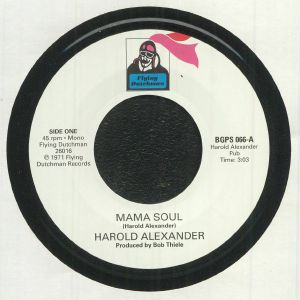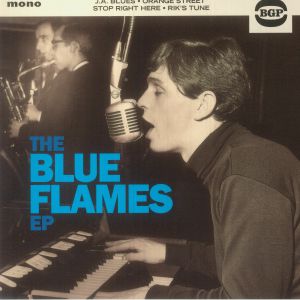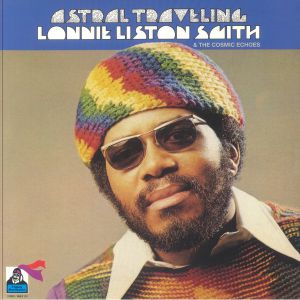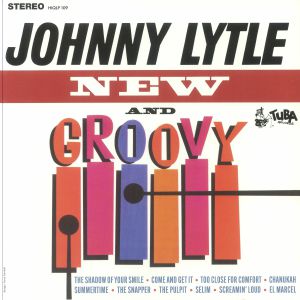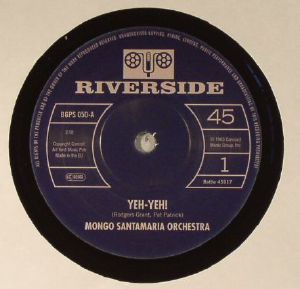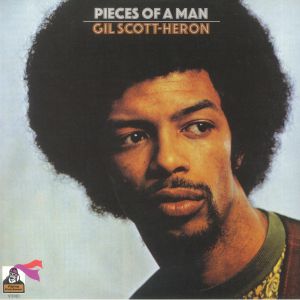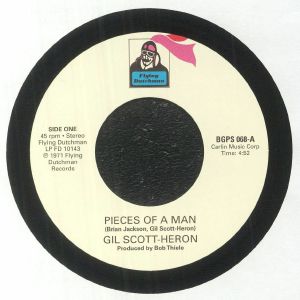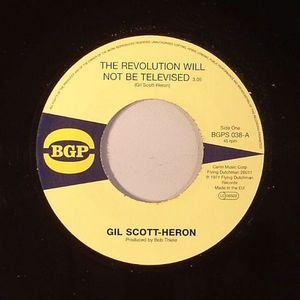Receive new release alerts for BGP
Filter
Type
アーティスト
Featured
リリースタイトル
値段
タグ
BGP レコード& CD
Browse the latest Vinyl & CD releases on BGP
1~8/8(ページ1/1)の商品
Review: Bernard "Pretty" Purdie and his Playboys were an iconic funk group of the late 70s who had big hits with the likes of Gil Scott Heron on his seminal 'The Revolution Will Not Be Televised' single. A year later on the same label, Flying Dutchman, they served up the 'Heavy Soul Slinger' single which gets reissued here. It's driven by big drum breaks and funky hits, with plenty of lush chords and rolling basslines all taking you on a high class and sophisticated trip. On the a-side is Harold Alexander 's 'Mama Soul' from the same era, but with a much more experimental sound rooted in wordless ad libs and frantic flutes.
… Read more in stock $12.45
Review: The Blue Flames' self-titled EP comes on 7" and follows up the well-received A Snapshot In Time CD compilation from last year. The group's singles are archetypal 50s and 60s soundtracks and have become highly in demand and collectible. Their proto-mod sound is truly distinctive and shines though her with tunes that have never before been available on vinyl. They are instrumentals as the lead singer had been told it was best for him to not sing outside of live shows. They come recorded in mono, like much music of the time, and with liner notes from Dean Rudland and all sound fantastic.
… Read more in stock $11.06
Review: Legendary keyboardist Lonnie Liston Smith worked with jazz greats like Dakota Staton, Max Roach, Abbey Lincoln, and Roland Kirk, formed a notable partnership with Pharoah Sanders and Leon Thomas, toured Europe with Gato Barbieri and played Fender Rhodes with Miles Davis, all before putting out his own solo album. Smith's debut, Astral Traveling, released on Bob Thiele's Flying Dutchman label features his Cosmic Echoes and includes life-affirming cosmic jazz tracks like 'Let Us Go Into The House Of The Lord' and 'In Search Of Truth.' This reissue includes a gatefold sleeve and liner notes by jazz critic Nat Hentoff.
… Read more in stock $26.54
Review: Johnny Lytle was a key figure in the early acid jazz scene who became renowned for his anthem 'Selim.' The Ohio vibraphonist also gained fame with his 1965 album The Village Caller on Riverside and after it closed he teamed up with label owner Orrin Keepnews for two albums on Detroit's Tuba. Ace reissued The Loop last year, and now BGP does the same with New And Groovy featuring a stellar lineup: Milt Harris (organ), Wynton Kelly (piano), George Duvivier (bass), Jimmy Cobb (drums), Montego Joe (congas), and Lytle on vibes make this a gem that includes original tracks like 'The Snapper' and 'The Pulpit,' plus the radical reworking of Miles Davis' 'Miles.' Though poorly distributed in 1967, this record has been acclaimed by DJs like Gilles Peterson.
… Read morePlayed by: Craig Charles Funk And Soul
in stock $26.54
Review: Cuban bandleader, composer and rumba magician Ramon Santamaria had a huge influence throughout his 40 year career, notably writing Coltrane's famous "Afro Blue". Here are two of many stand-out cuts from his 1963 album Watermelon Man! While most the album's focus was on his Herbie Hancock cover, it's tracks like these that really gave the album its spirit and unique character; "Yeh Yeh!" is a samba shaking horn-led cut laced with crackling percussion and party cries while "Get The Money" leans back with rhythm and blues sass and a rhythm that's as powerful as Ramon's legacy. Moneymaker shaking guaranteed.
… Read more in stock $11.06
Pieces Of A Man (AAA 2 Disc Edition) (gatefold 180 gram vinyl 2xLP)
Cat: XXQLP 2094. Rel: 27 Oct 22
Soul
Review: Originally planned for release last year to mark the 50th anniversary of the album's creation, Gil Scott-Heron's most renowned full-length returns in stunning, audiophile quality sound. This time round, the album has been stretched across two discs, both of which have been pressed at 45rpm for louder sound. Created by Scott-Heron and musical sparring partner Brian Jackson with the assistance of producer Bob Thiele, Pieces of a Man remains an incredible album, with a string of classic cuts - think 'Home is Where The Hatred Is', 'The Revolution Will Not Be Televised' and 'Save the Children' - being joined by such lesser-celebrated delights as the fizzing 'Lady Day and John Coltrane', the blissful 'I Think I'll Call It Morning' and 'A Sign of the Ages'.
… Read morePlayed by: Craig Charles Funk And Soul, Juno Recommends Soul
in stock $40.11
Review: Gil Scott-Heron's 'Pieces Of A Man' was the first LP recorded by the poet and musician, made and released in 1971. Owing to the album's importance, BGP have released two of its most standout tracks, the title track and 'Think I'll Call It Morning', on a limited 7" that will doubtess prove exceptionallyy handy for DJs who need to get straight down to business.
… Read morePlayed by: I Love 45's!, Juno Recommends Soul
in stock $11.06
Review: Wow, classics don't come much more special than this. A like-for-like repress of the 1970 RCA release, both sides here are soaked in Scott Heron's raw troubled soul. The endlessly sampled, hugely powerful and perfectly funky "Revolution" remains almost as poignant and prophetic as it was the day it was penned. "Home Is Where The Hatred Is" is much more personal and reveals his talent as a singer as much as the lead track boasts his poetry and ability to deliver a strong message.
… Read morein stock $12.45
1~8/8(ページ1/1)の商品

 USD
USD





